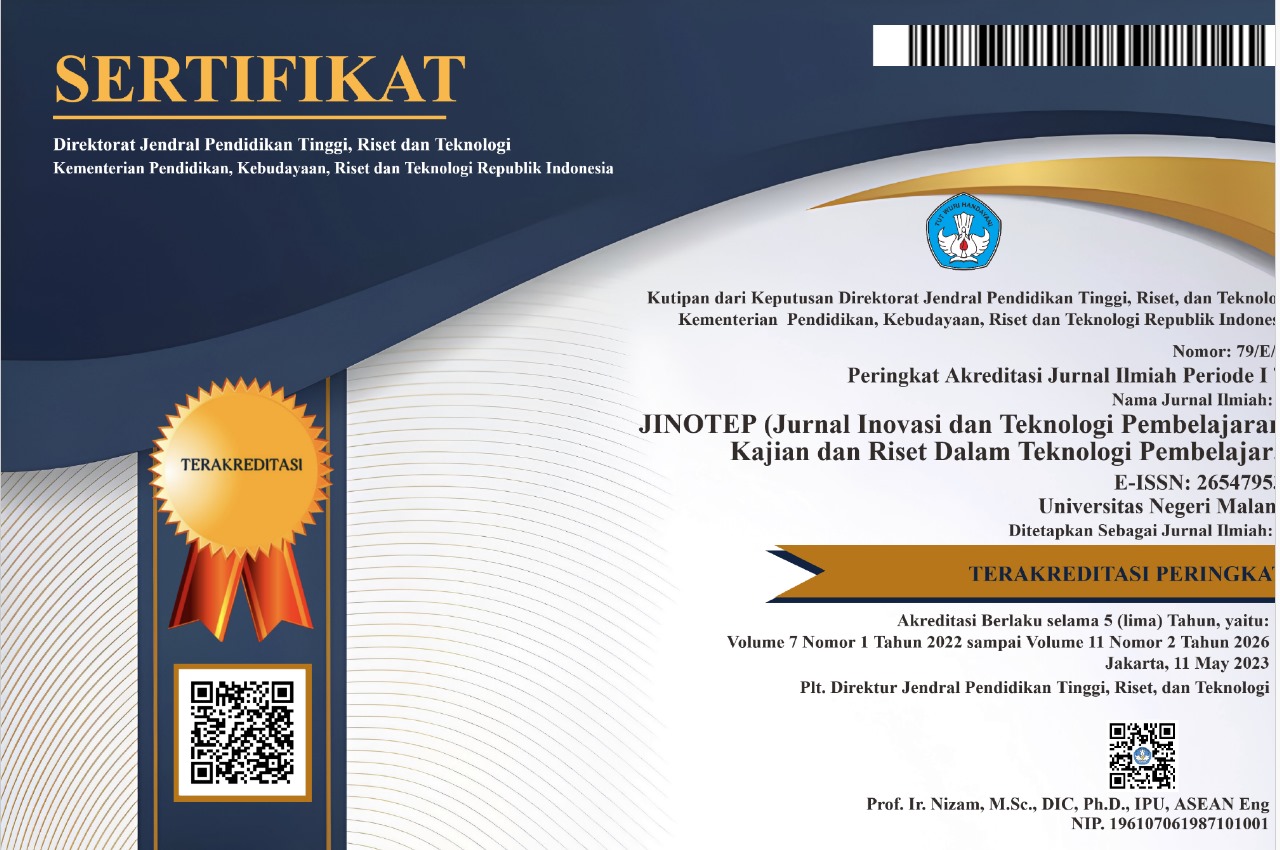Online Learning Evaluation of Mathematics Using the CIPP Model
Abstract
Abstrak: Tujuan dari penelitian ini untuk menganalisis serta mengevaluasi pelaksanaan pembelajaran daring khususnya pada mata pelajaran matematika dengan menerapkan salah satu model evaluasi yaitu model CIPP (Context, Input, Process, Product). Adapun pendekatan dalam penelitian ini adalah kualitatif dengan jenis penelitian evaluasi. Sumber data penelitian terdiri dari data primer, yaitu berupa catatan-catatan hasil wawancara kepada beberapa informan yang dianggap kredibel dalam memberikan data. Serta didapatkan dari hasil observasi langsung terhadap kegiatan belajar mengajar. Jenis instrumen dalam penelitian ini berupa pedoman wawancara, lembar observasi, serta dokumentasi. Berdasarkan paparan data maka dapat disimpulkan bahwa ditinjau pada bagian pelaksanaan pembelajaran cukup efektif antara lain beban kerja guru, jumlah rombongan belajar, serta pengelolaan kelas yang lengkap dan terorganisasi dengan baik. Adapun temuan yang perlu di evaluasi antara lain manajemen waktu belajar yang kurang optimal guna tercapainya tujuan belajar. Selain itu, pada tahap penilaian yang merupakan bagian dari pembelajaran belum tepat sasaran.
Abstract: The purpose of this study is to analyze and evaluate the implementation of online learning, especially in mathematics by applying one of the evaluation models, namely the CIPP model (Context, Input, Process, Product). The approach in this research is qualitative with the type of evaluation research. The research data sources consist of primary data, namely in the form of notes from interviews with several informants who are considered credible in providing data. And obtained from direct observation of teaching and learning activities. The types of instruments in this study were interview guides, observation sheets, and documentation. Based on the data exposure, it can be concluded that in terms of the implementation of the learning process, it is quite effective, including the teacher's workload, the number of study groups, as well as complete and well-organized class management. The findings that need to be evaluated include less than optimal learning time management in order to achieve learning objectives. In addition, at the assessment stage, which is part of the learning process, it is not right on target.
Keywords
Full Text:
PDFReferences
Agustina, N. Q., & Mukhtaruddin, F. (2019). The CIPP model-based evaluation on integrated english learning (iel) program at language center. English Language Teaching Educational Journal, 2(1), 22–31. https://doi.org/10.12928/eltej.v2i1.1043
Al-Shanawani, H. M. (2019). Evaluation of self-learning curriculum for kindergarten using Stufflebeam’s CIPP model. SAGE Open, 9(1), 1–13. https://doi.org/10.1177/2158244018822380
Ardiyanti, N. M. D., Mahayukti, G. A., & Sugiarta, I. M. (2020). Evaluasi proses pembelajaran matematika secara daring di SMAN Kota Singaraja. Journal of Chemical Information and Modeling, 18(9), 136–157.
Asadi, M., Kiany, G. R., Akbari, R., & Samar, R. G. (2016). Program evaluation of the new english textbook (prospect 1) in the Iranian Ministry of Education. Theory and Practice in Language Studies, 6(2), 291–301. https://doi.org/10.17507/tpls.0602.10
Aziz, S., Mahmood, M., & Rehman, Z. (2018). Implementation of CIPP model for quality evaluation at school level: a case study. Journal of Education and Educational Development, 5(1), 189–206. https://doi.org/10.22555/joeed.v5i1.1553
Basaran, M., Dursun, B., Gur Dortok, H. D., & Yilmaz, G. (2021). Evaluation of preschool education program according to CIPP model. Pedagogical Research, 6(2), 1–13. https://doi.org/10.29333/pr/9701
Batdı, V. (2017). Comparing the high school english curriculum in Turkey through multi-analysis. Kuram ve Uygulamada Egitim Bilimleri, 17(4), 1255–1290. https://doi.org/10.12738/estp.2017.4.0490
Bhakti, B.Y. (2017). Evaluasi Program model CIPP pada proses. Jurnal Inovasi Pendidikan Fisika Dan Riset Ilmiah, 1(2), 75–82.
Bilfaqih, Y., & Qomarudin, M. N. (2015). Esensi penyusunan materi pembelajaran daring. Yogyakarta: Deepublish.
Doyok, R. (2021). Model evaluasi CIPP dalam mengevaluasi program tahfiz selama daring di SMP Islam Al-Ishlah Bukittinggi. Ideas: Jurnal Pendidikan, Sosial, Dan Budaya, 7(3), 73–82. https://doi.org/10.32884/ideas.v7i3.429
Erdogan, G., & Mede, E. (2021). The Evaluation of an english preparatory program using CIPP model and exploring a1 level students’ motivational beliefs. Journal of Education and Educational Development, 8(1), 53–76. https://doi.org/10.22555/joeed.v8i1.109
Fahruddin. (2020). Evaluasi program pembelajaran sejarah menggunakan model context, input, process, product (CIPP). HISTORIA: Jurnal Program Studi Pendidikan Sejarah, 8(2), 199–211. https://doi.org/10.24127/hj.v8i2.2325
Haqien, D., & Rahman, A. A. (2020). Pemanfaatan zoom meeting untuk proses pembelajaran pada masa pandemi Covid-19. SAP (Susunan Artikel Pendidikan), 5(1), 51–56. https://doi.org/10.30998/sap.v5i1.6511
Hijazi, D., & Alnatour, A. (2021). Online learning challenges affecting students of english in an efl context during covid-19 pandemic. International Journal of Education and Practice, 9(2), 379–395. https://doi.org/10.18488/journal.61.2021.92.379.395
Instruksi Menteri Dalam Negeri No 32 Tahun 2021. (2021). Pemberlakuan Pembatasan Kegiatan Masyarakat Level 3, Level 2 dan Level 1 Serta Mengoptimalkan Posko Penanganan Coronavirus Disease 2019 di Tingkat Desa dan Kelurahan Untuk Pengendalian Penyebaran Corona Vi (pp. 2013–2015).
Jayul, A., & Irwanto, E. (2020). Model pembelajaran daring sebagai alternatif proses kegiatan belajar pendidikan jasmani di tengah pandemi Covid-19. Jurnal Pendidikan Kesehatan Rekreasi, 6(2), 190–199. https://doi.org/10.5281/zenodo.3892262
Johnson, N., Veletsianos, G., & Seaman, J. (2020). U.S. faculty and administrators’ experiences and approaches in the early weeks of the COVID-19 pandemic. Online Learning Journal, 24(2), 6–21. https://doi.org/10.24059/olj.v24i2.2285
Kuntarto, E. (2017). Keefektifan model pembelajaran daring dalam perkuliahan bahasa indonesia di perguruan tinggi. Journal Indonesian Language Education and Literature, 1(2), 207–220. https://doi.org/10.24235/ileal.v3i1.1820
Luma, M., Tola, A., & Hadirman, H. (2020). Evaluasi implementasi k-13 berdasarkan model CIPP di SDN 2 Tabongo Kabupaten Gorontalo. Jurnal Ilmiah Iqra’, 14(2), 186–204. https://doi.org/10.30984/jii.v14i2.1307
Mirzazadeh, A., Gandomkar, R., Hejri, S. M., Hassanzadeh, G., Koochak, H. E., Golestani, A., Jafarian, A., Jalili, M., Nayeri, F., Saleh, N., Shahi, F., & Razavi, S. H. E. (2016). Undergraduate medical education programme renewal: a longitudinal context, input, process and product evaluation study. Perspectives on Medical Education, 5(1), 15–23. https://doi.org/10.1007/s40037-015-0243-3
Özhan, Ş. Ç., & Kocadere, S. A. (2020). The Effects of flow, emotional engagement, and motivation on success in a gamified online learning environment. Journal of Educational Computing Research, 57(8), 2006–2031. https://doi.org/10.1177/0735633118823159
Peraturan Menteri Pendidikan Dan Kebudayaan Nomor 22 Tahun 2016 Tentang Standar Proses Pendidikan Dasar dan Menengah.
Prisuna, B. F. (2021a). Efektivitas media pembelajaran daring melalui google meet pada mata kuliah metodologi penelitian kualitatif. Jurnal Pena Edukasi, 8(1), 15–24. http://jurnal.goretanpena.com/index.php/JPE
Prisuna, B. F. (2021b). Pengaruh penggunaan aplikasi google meet terhadap hasil belajar. Jurnal Penelitian Ilmu Pendidikan, 14(2), 45–49. https://doi.org/10.21831/jpipfip.v14i1.39160.
Raibowo, S., & Nopiyanto, Y. E. (2020). Evaluasi pembelajaran pendidikan jasmani olahraga & kesehatan pada SMP negeri se-kabupaten mukomuko melalui pendekatan model context , input , process & product (CIPP). Jurnal Pendidikan Kesehatan Rekreasi, 6(2), 146–165. https://doi.org/10.5281/zenodo.3881891
Ratnawulan, E., & Rusdiana, A. (2014). Evaluasi pembelajaran. Bandung: Pustaka Setia.
Riptiani, K. M., Manuaba, I. B. S., Putra, M., Pendidikan, J., Sekolah, G., & Ganesha, U. P. (2015). Studi evaluasi implementasii kurikulum 2013 ditinjau dari CIPP pada sekolah dasar negeri di wilayah pedesaan Kabupaten Badung. Jurnal PGSD, 3(1), 1–12.
Samoling, I. E., Ismanto, B., & Rina, L. (2021). Evaluasi program pembelajaran ekonomi secara daring pada masa pandemi Covid di SMAN 2 Salatiga. Journal of Educational Technology, Curriculum, Learning, and Communication, 1(3), 125–131.
Stufflebeam, D. L. (1971). The relevance of the CIPP evaluation model for educational accountability.
Stufflebeam, D. L. (2003). The CIPP Model for Evaluation. In International Handbook of Educational Evaluation.
Stufflebeam, D. L. (2011). Meta-evaluation. Journal of MultiDisciplinary Evaluation, 7(15), 99–158. https://doi.org/10.1016/S0883-0355(97)90031-8
Stufflebeam, D. L., & Zhang, G. (2017). The CIPP evaluation model (how to evaluate for improvement and accountability). New York London: The Guilford Press.
Surahman, E., & Pratama, U. N. (2021). Online observation protocol to supervise online learning and its sample report. Advances in Social Science, Education and Humanities Research, 601, 6–12.
Uğur, A., B uuml lent, A., & Hakan, K. (2016). Evaluation of the curriculum of English preparatory classes at Yildiz Technical University using CIPP model. Educational Research and Reviews, 11(7), 466–473. https://doi.org/10.5897/err2016.2638
Undang-Undang Republik Indonesia Nomor 20 Tahun 2003 Tentang Sistem Pendidikan Nasional, (2003).
Uno, H. B., & Koni, S. (2013). Assessment pembelajaran. Jakarta: Bumi Aksara.
Wirawan. (2016). Evaluasi: teori, model, metodologi, standar, aplikasi dan profesi. Jakarta: Rajawali Pers
DOI: http://dx.doi.org/10.17977/um031v9i22022p167
Refbacks
- There are currently no refbacks.
Copyright (c) 2022 Bayu Fitra Prisuna

This work is licensed under a Creative Commons Attribution-ShareAlike 4.0 International License.
======================================================================
Jurnal Inovasi dan Teknologi Pembelajaran published by Universitas Negeri Malang in collaboration with the Asosiasi Program Studi Teknologi Pendidikan Indonesia (APS TPI) and Ikatan Profesi Teknologi Pendidikan Indonesia (IPTPI) with a MoU.
Publisher Address:
Educational Technology Laboratorium, Building D5, 1st Floor
Faculty of Education, Universitas Negeri Malang
Semarang St. No. 5, Malang City, East Java Province, Postal Code 65145
Email: jinotep.fip@um.ac.id
======================================================================

JINOTEP is licensed under a Creative Commons Attribution-ShareAlike 4.0 International License.
JINOTEP Statistics (Since July 13th, 2020)


.png)




.png)
1.png)
1.png)
4.png)
2.png)
1.png)
1.png)
.png)


_3.png)





1.png)
.png)